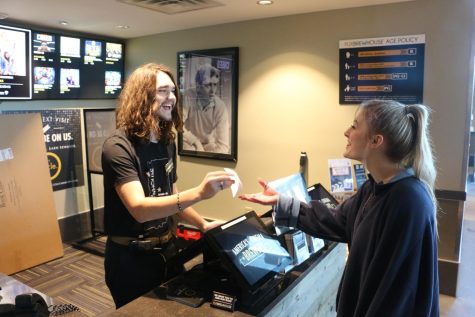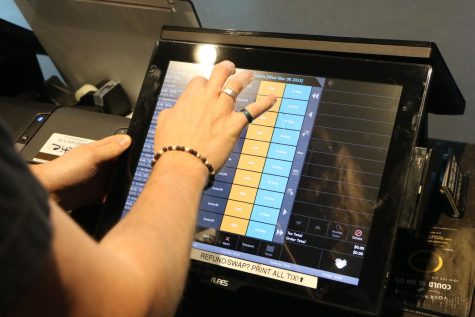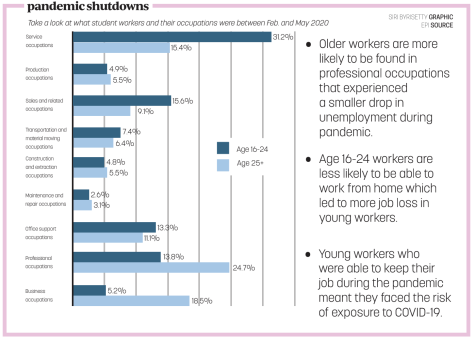
Junior Sam Hankins works at Flix Brewhouse, a theater and restaurant. He said the experience of working at a part-time job has helped him in other areas.
“I run people’s food, I make drinks sometimes and I clean the theaters. You get experience and are taught how to talk to people as well as how to take complaints and if something’s wrong with their food, I’ve learned how to get that fixed,” he said. “I think my people skills have probably improved.”
Hankins is one of many high school students who has a part-time job. According to Statista, roughly 20% of high school students in the United States aged 16 to 19 are currently working, an increase from the past year.
Ann Boldt, College & Career Readiness Center (CCRC) counselor, said part-time jobs like Hankins’ can provide valuable skills that can be applied to the workforce later.
Boldt said, “I think that jobs are wonderful if a student can balance (jobs) with their academics and other extracurriculars. It brings so much in terms of critical skills to be successful in the future, meaning time management skills, dependability and customer service.”
Moreover, CCRC counselor Harry Pettibone said students can also gain a sense of responsibility and teamwork skills.
“(You have to) be there on time (and) do your job,” he said. “(Students with jobs also) learn team plays. (They are) working with their fellow colleagues that are working with the managers and also customer relations and how to deal with people.”
However, Pettibone said schoolwork should come before a part-time job.
“Your studies should come before the responsibilities of the job so you have to do good time management,” Pettibone said. “Don’t give (your job) it priority over your homework; you’re a student, not an employee, and you need to work at attaining good grades and performing your best in high school.”
For Hankins’ part, he said he has found a way to balance schoolwork and his job.
“Usually I work from 5 p.m. to whenever we close. I work three days a week, and one day on the weekend (while being) tutored during the school week so I usually do have enough time to get my homework done,” he said.
Boldt said she has seen examples of students like Hankins who are able to prioritize their work. Avoiding procrastination, she said, is key.
“To me, the students that are busier are the ones that don’t procrastinate because they know they don’t have that extra few hours at the end of the night,” she said. “I think that social media can also be dangerous and a time-sucker. I would really encourage everyone to limit the number of hours that a student allows themselves to be on social media.”
Boldt and Pettibone also encourage students to find summer internships if they do not have time over the summer for a bigger job. Boldt said that even though jobs are not necessary for college, it shows what students are interested in and provides a beneficial experience that may help with applications.
Pettibone said summer internships diverge from jobs, because students should prioritize academics during the school year but can put their whole focus on an internship during the summer months.

However, he said students should not continue with their high-school jobs throughout college.
“This is a transitional time in life and it may not be conducive for you to keep that job,” Pettibone said. “The priority needs to be on education rather than the job because you want to get off to a good start, and that’s another whole higher level of academic expectations.”
To that end, Hankins said he believes he will move on from his job when he starts college.
He said, “I’d probably not (continue my job) if I go off to college. I plan on taking an internship in a company position if it becomes available.”
Boldt provides her opinion on how the recent COVID-19 pandemic has affected the job market. Because of the huge drop in employee availability through the pandemic, more jobs have become accessible for students.
She said, “People are scrambling a lot more to hire, and I don’t know why some students aren’t going to find those jobs or take those jobs, especially because I think the pay is definitely better. I do feel bad for some of these stores and restaurants that they sometimes have to have shortened work hours because they can’t find people to work. I think it’s been harder for them, but there’s jobs out there for students to have and there are clearly jobs available. If a student wants a job, there’s no reason why a student cannot find a job. I think it’s an excellent landscape for students to find a job.”
Pettibone said he shared Boldt’s beliefs. Despite the changes of a post-pandemic world, employers still need to hire, and this shows as more employers are increasing wages and providing more benefits.
“My perception is that there is a job shortage; kids can find a job pretty quickly because of the shortage. (Employers are) willing to pay more than they did prior to COVID,” he said. “It certainly had an effect for a year and a half, when the pandemic was a reality. It’s now post-pandemic and I think things are getting back to normal more than usual, but it definitely affected the hospitality industry, since it depends on people going out to movies, theaters, eating out, attending spectator sports, those kinds of things.”
Overall, Boldt said CCRC attendance has started to rebound compared to pre-pandemic levels. Although many come in for college advice, the number of students coming in for job counseling has also increased compared to the past few years.
“We’ve been exploding in terms of people coming in,” she said. “We’ve seen so many more students even to this date this year than we did last year in terms of personal encounters. I think, partly, we’ve increased our services and we keep making it better every year. I think it helps that we are now so visible, being right here in the senior hallway.”
Both Boldt and Pettibone said there are many available resources for students looking for a part-time job, including CCRC counselor Melinda Stephan’s bulletin of open jobs on the counseling Canvas course.
Ultimately, Pettibone said while employment has its benefits, school should always come first.
“Being an educator, I cannot emphasize enough, do not give (the job) priority over the academics and have fun as a student first and foremost. It’s the only time in this life you’ll be a high school student,” he said. “Enjoying the aspects not only academic, but the social aspects of high school and a part-time job is nice as it gives you extra spending money and may help out your family, but I am of the opinion that a high school age teenager should have things that come before a part-time job.”


































![AI in films like "The Brutalist" is convenient, but shouldn’t take priority [opinion]](https://hilite.org/wp-content/uploads/2025/02/catherine-cover-1200x471.jpg)










































![Review: “The Immortal Soul Salvage Yard:” A criminally underrated poetry collection [MUSE]](https://hilite.org/wp-content/uploads/2025/03/71cju6TvqmL._AC_UF10001000_QL80_.jpg)
![Review: "Dog Man" is Unapologetically Chaotic [MUSE]](https://hilite.org/wp-content/uploads/2025/03/dogman-1200x700.jpg)
![Review: "Ne Zha 2": The WeChat family reunion I didn’t know I needed [MUSE]](https://hilite.org/wp-content/uploads/2025/03/unnamed-4.png)
![Review in Print: Maripaz Villar brings a delightfully unique style to the world of WEBTOON [MUSE]](https://hilite.org/wp-content/uploads/2023/12/maripazcover-1200x960.jpg)
![Review: “The Sword of Kaigen” is a masterpiece [MUSE]](https://hilite.org/wp-content/uploads/2023/11/Screenshot-2023-11-26-201051.png)
![Review: Gateron Oil Kings, great linear switches, okay price [MUSE]](https://hilite.org/wp-content/uploads/2023/11/Screenshot-2023-11-26-200553.png)
![Review: “A Haunting in Venice” is a significant improvement from other Agatha Christie adaptations [MUSE]](https://hilite.org/wp-content/uploads/2023/11/e7ee2938a6d422669771bce6d8088521.jpg)
![Review: A Thanksgiving story from elementary school, still just as interesting [MUSE]](https://hilite.org/wp-content/uploads/2023/11/Screenshot-2023-11-26-195514-987x1200.png)
![Review: "When I Fly Towards You", cute, uplifting youth drama [MUSE]](https://hilite.org/wp-content/uploads/2023/09/When-I-Fly-Towards-You-Chinese-drama.png)
![Postcards from Muse: Hawaii Travel Diary [MUSE]](https://hilite.org/wp-content/uploads/2023/09/My-project-1-1200x1200.jpg)
![Review: "Ladybug & Cat Noir: The Movie," departure from original show [MUSE]](https://hilite.org/wp-content/uploads/2023/09/Ladybug__Cat_Noir_-_The_Movie_poster.jpg)
![Review in Print: "Hidden Love" is the cute, uplifting drama everyone needs [MUSE]](https://hilite.org/wp-content/uploads/2023/09/hiddenlovecover-e1693597208225-1030x1200.png)
![Review in Print: "Heartstopper" is the heartwarming queer romance we all need [MUSE]](https://hilite.org/wp-content/uploads/2023/08/museheartstoppercover-1200x654.png)



